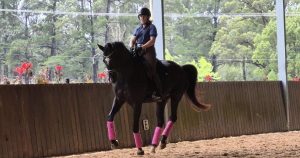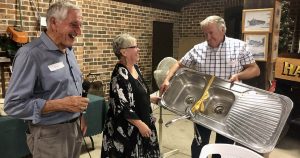By Greta Wickham
Unfortunately, the Garden Club Committee made the decision not to meet in November due to the uncertainty of restrictions regarding Covid.
It has been a turbulent year. At the beginning of the year, we thought we were back to normal, planned guest speakers, organised a member lunch only to have to cancel it all.
And to add insult to injury we now announce the committee have decided to cancel the OPEN GARDEN WEEKEND for 2021 with the ambitious plans for an open weekend in the early part of 2022.
We do plan however to be back to our regular meetings in February 2022 when members and new members will be warmly welcome. Just to let you know any botanical knowledge will be entirely adequate as our members range from beginners to very experienced.
In the meantime, we are all busy gardening in the Spring which does bring some challenges. In my garden there has been, struggling lawn, Onion Weed and Black beetle just to name a few.
We have an area of lawn that struggles to perform so lately we have taken to using wettasoil to improve the hydration of the soil by re-wetting and improving water penetration. Wettasoil is enriched with seaweed extract to reduce lawn stress and improve lawn and soil health. In only a few weeks we have seen an improvement. Now we will fertilize the lawn and hopefully, with the wettasoil and fertilizer we will have a much better result this year
The onion weed has been increasing in my garden. Onion weed is a perennial with thin green strappy leaves growing from a mainly white bulb which gives off an onion smell when crushed.
Flowers grow at the top of a long stalk and are mainly white. I don’t try to pull out the weed as small bulblets tend to pull away from the mother plant which leaves more bulbs in the ground that will rapidly grow. If you do dig the weed-clump out of the ground with a spade or a trowel, throw the entire clump away.
To totally eradicate the onion weed, treat the area with a non-selective herbicide, being careful not to touch other plants in the area. It can help to add a small amount of household detergent which when added to the mix helps the herbicide to stick to the waxy leaf and penetrate to do its work.
You may have to repeat the process if any new onion weeds begin to grow. If you are unable to treat the area, keep the plants trimmed near the ground as this will prevent the onion weed from flowering and spreading to other parts of your lawn or garden through seeds. Also, I read that cutting off the foliage at ground level with shears will prevent it from making food for the bulbs and they will become progressively weaker.
Onion weed is more commonly found in undernourished soils, or where soil pH is unsuitable for healthy plant growth. Where onion weed has been a problem, check your soil pH, and improve organic matter content in the soil to prevent the problem from recurring. Persistence and patience is the action that I will try to be better at this year.
From the photo taken near our alfresco, you will notice evidence that the African Black Beetle is beginning to strike again on our lawn. Symptoms of damage could be Straw-like leaves, Yellowing leaves or patches of turf where roots have been chewed, turf is easily lifted from the soil surface similar to rolling back a corner of the carpet. For control of black beetles, Yates suggested Baythroid Advanced Insect Killer for Lawns.
For more information regarding the Galson District Garden Club please visit our website: www.galstongardenclub.com.au or email: [email protected]






